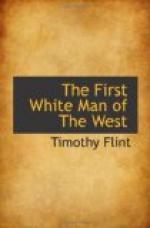Among other worthy associates of Boone, we may mention the family of McAffee. Two brothers, James and Robert, emigrated from the county of Botetourt, Virginia, and settled on Salt river, six miles from Harrodsburgh. Having revisited their parent country, on their return they brought with them William and George McAffee. In 1777, the Indians destroyed the whole of their valuable stock of cattle, while they were absent from Kentucky. In 1779 they returned, and settled McAffee’s station, which was subsequently compelled to take its full share in the sufferings and dangers of Indian hostilities.
Benjamin Logan immigrated to the country in 1775, as a private citizen. But he was a man of too much character to remain unnoted. As his character developed, he was successively appointed a magistrate, elected a member of the legislature and rose, as a military character, to the rank of general. His parents were natives of Ireland, who emigrated, while young, to Pennsylvania, where they married, and soon afterwards removed to Augusta county, Virginia.
Benjamin, their oldest son, was born there; and at the age of fourteen, lost his father. Charged, at this early age, with the care of a widowed mother, and children still younger than himself, neither the circumstances of his family, of the country, or his peculiar condition, allowed him the chances of education. Almost as unlettered as James Harrod, he was a memorable example of a self-formed man. Great natural acuteness, and strong intellectual powers, were, however, adorned by a disposition of uncommon benevolence. Under the eye of an excellent father, he commenced with the rudiments of common instruction, the soundest lessons of Christian piety and morality, which were continued by the guidance and example of an admirable mother, with whom he resided until he was turned of twenty-one.
His father had deceased intestate, and, in virtue of the laws then in force, the whole extensive inheritance of his father’s lands descended to him, to the exclusion of his brothers and sisters. His example ought to be recorded for the benefit of those grasping children in these days, who, dead to all natural affection, and every sentiment but avarice, seize all that the law will grant, whether equity will sanction it or not. Disregarding this claim of primogeniture, he insisted that the whole inheritance should be parceled into equal shares, of which he accepted only his own. But the generous impulses of his noble nature, were not limited to the domestic circle. His heart was warm with the more enlarged sentiments of patriotism. At the age of twenty-one, he accompanied Colonel Beauquette, as a serjeant, in a hostile expedition against the Indians of the north. Having provided for the comfortable settlement of his mother and family on James River, Virginia, he moved to the Holston, where he settled and married.




